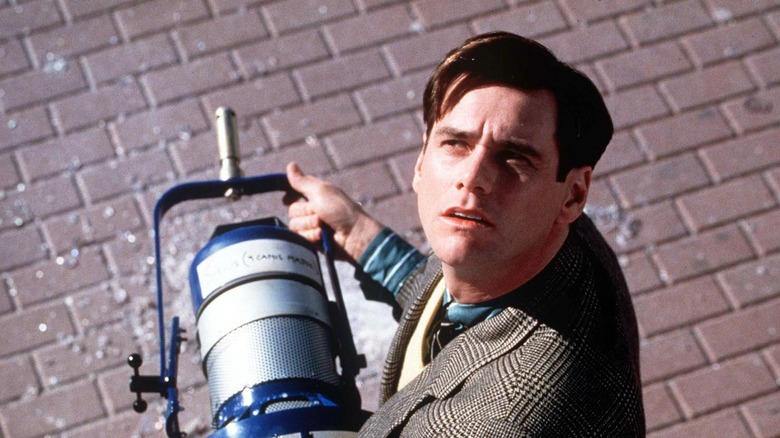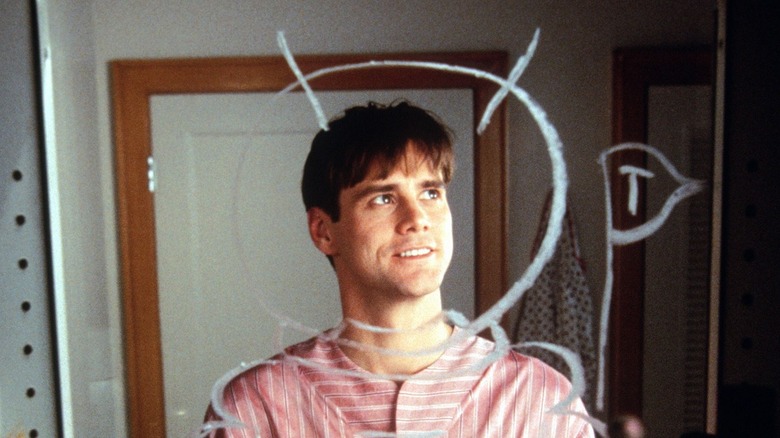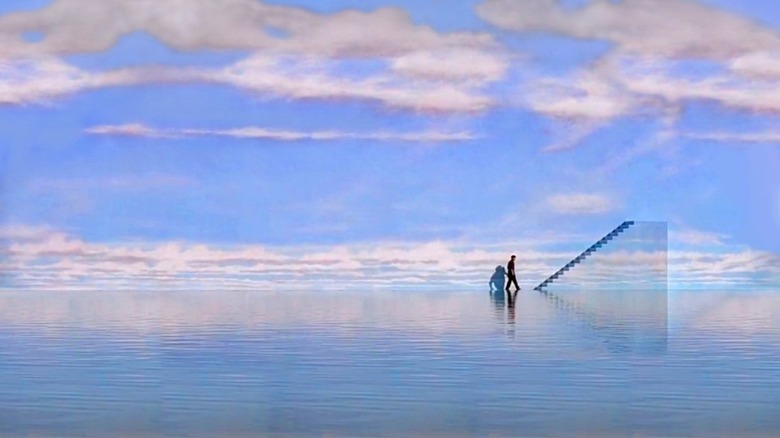The Truman Show Almost Had A Very Different Star And Director
That Peter Weir's 1998 film "The Truman Show" managed to claim as many accolades as it did was kind of extraordinary. It was nominated for three Academy Awards — Best Director, Best Supporting Actor, and Best Screenplay — and won numerous other awards from various other critical bodies. Part comedy, part high-concept sci-fi film, "The Truman Show" followed the everyday life of the good-natured everyman Truman Burbank (Jim Carrey) as he treks to and from work, makes small talk with his neighbors, and enjoys evenings with his wife Meryl (Laura Linney).
Unbeknownst to Truman, however, he is the lone subject of an elaborate, lifetime-long unscripted TV show watched by billions the world over. His hometown is completely enclosed in an enormous dome, and all the people he has interacted with for his entire life are being fed lines and scenes by the show's all-seeing director Christof (Ed Harris).
Truman, now an adult, has begun to suspect that there is something ... off ... about his existence. As the film progresses, Truman will find more and more cracks in his reality, as when a spotlight slips out of its place and crashes to the ground in front of him. Despite its eerie premise, Weir and Carrey (whose high-paying contract allowed the actor script re-writes) ultimately presented "The Truman Show" as a tale of liberation. The film is oddly sentimental and uplifting; more Frank Capra than Rod Serling.
One might well imagine a more horrific, paranoia-forward version of this story. And, as a 2018 oral history in Vanity Fair once pointed out, that seems to have initially been the plan. There was a version of "The Truman Show" where Gary Oldman played the lead and Brian De Palma directed.
The star is the script
In the oral history, producer of "The Truman Show," Lyne Plechette recalls a time when test footage was needed as a proof-of-concept reel for the studio. Fellow producer Scott Rudin (who was recently ousted for abusive behavior) called in a favor from actor Gary Oldman to provide that footage. According to Plechette, Oldman was brought in to play Truman Burbank only for this test footage. Oldman, evidently, understood that Andrew Niccol's script was the star, and he had no interest in actually playing the lead.
The scene in question was to depict Truman coming to the end of his rope. He was certain that the people around him were all actors, and they all knew his name. Truman snatched an infant out of a baby carriage and threated to kill it if the mother didn't admit she knew who he was. When he gathered his wits and handed the baby back to the mother, she was to say "Thank you, Truman." It's like something out of "The Stepford Wives," or perhaps Kurt Vonnegut's "Breakfast of Champions."
This falls in line with other stories about how the original script for "The Truman Show" was a lot darker than what film audiences eventually saw. In an earlier draft, Truman wasn't a kind everyman, but an alcoholic who was having an affair, and who witnessed assaults without ever intervening. All this, while being watched by billions. It seems a coat of inky black guilt and moral ambiguity was initially part of the film.
To match that darkness, "The Truman Show" had once hired Brian De Palma to direct, a filmmaker best known for his twisty thrillers and depraved stories of murder and sex.
The De Palma show
Anyone familiar with De Palma's work knows that voyeurism is a big part of his oeuvre. There are multiple scenes throughout the director's filmography that depict characters taking pictures through windows, or simply spying on others. In the finished version of "The Truman Show," the audience and Truman both learn at the same time that his life is being filmed. According to the oral history, De Palma wanted to tell the story from the camera's perspective, the audience peeping in on Truman throughout. He likely wanted "The Truman Show" to be, essentially, a sizzle reel for the in-universe Truman show. Knowing De Palma, he would have likely made clever use of split screens.
De Palma eventually left the project to work on the 1996 spy film "Mission: Impossible," back when it was a single, terse spy thriller, and not a high-octane series of Tom Cruise midlife crises. It was at this point that Rudin called Peter Weir to direct, and that Jim Carrey became interested in playing the lead.
Given some of the titles in his filmography, Carrey seems to have aspired to be the next James Stewart. This is clearest in the 1999 Frank Darabont film "The Majestic," but it seems to factor into "The Truman Show" as well. Because he was so powerful in Hollywood in the 1990s, Carrey seems to have remade "The Truman Show" into the type of film he wanted it to be.
As it stands, audiences can only imagine the dark version that it once was.


